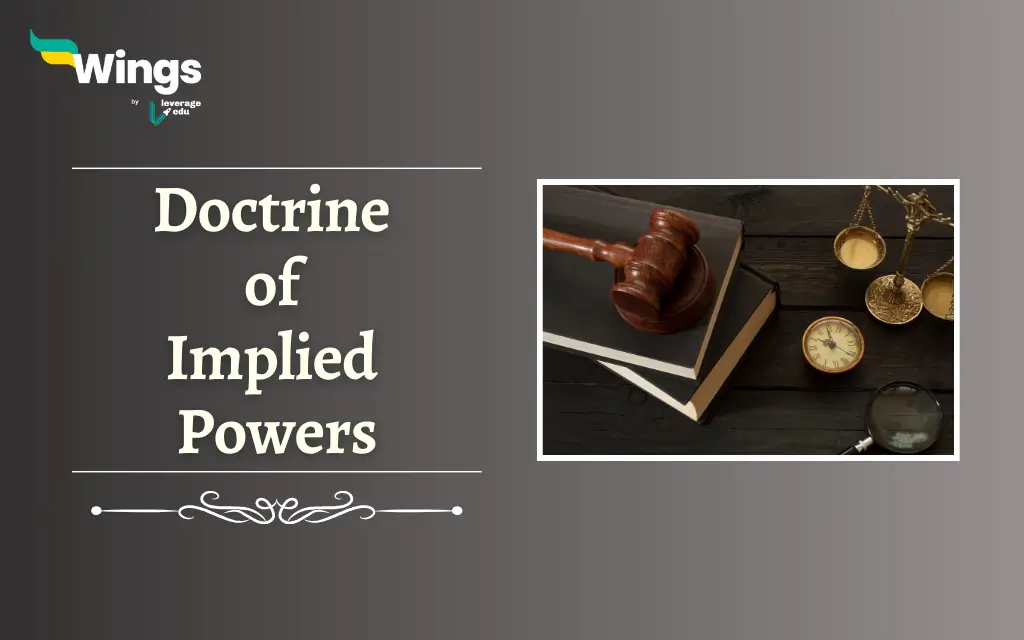The Doctrine of Implied Powers is also known as the Doctrine of Implication. Moreover, it originates from the principle that giving a specific power naturally grants the required means to exercise that power. In simpler terms, if someone gives you a job to do, they are also giving you the tools and resources you need to complete it successfully. Therefore, this Doctrine can be used in legal situations where a law grants a specific jurisdiction. Moreover, it means that the law also implicitly grants the power to take any actions or use any methods that are important for carrying out that jurisdiction. Read on to learn more about the Doctrine of Implied Powers, the Concept in India, Case Law Examples and the Doctrine of Implied Prohibition.
What is the Concept of Implied Powers in India?
The Supreme Court of India has addressed the Doctrine of Implied Powers and explains its use when a law assigns a duty or grants a power to an authority.
- If fulfilling that duty or exercising that power is impossible without considering an additional, incidental power, then the Doctrine of Implied Powers can be justified.
- In such cases, without this Implied Power, the law itself becomes unenforceable.
- However, this impossibility must be a general one, meaning it renders the duty or power impossible to carry out in all situations.
- Furthermore, the statutory provision would become meaningless and unenforceable unless this supplementary power is Implied.
Also Read: Separation of Powers in a Democracy
Doctrine of Implied Powers Case Law Example
The Supreme Court of India has used the Doctrine of Implied Powers in many milestone cases. Here are 4 Examples:
- Gopal Chandra Misra in 1978: The Court recognised an Implicit Power for State High Court judges under Article 217.
- This power allows them to cancel a resignation even after it has been accepted, thus giving a bit of flexibility in such situations.
- Rupa Ashok Hurra in 2002: In this case, the Court established its innate authority to revisit its judgments.
- This paves the way for “curative petitions” requests for reconsideration of final judgements.
- Moreover, particularly to prevent obvious failure of justice or misuse of legal procedures.
- Raja Ram Pal in 2007: The Court decided that the Indian Parliament has an Implied Power under Article 105 to remove its members for Contempt.
- Additionally, this power helps to maintain decorum and ethical conduct within the legislative body.
- Salil Sabhlok in 2013: In this case, the Court interpreted Article 316 beyond the surface.
- While it grants the State Governor the power to appoint members of the State Public Service Commission (SPSC), the Court found an Implied Power to establish procedures for such appointments as well.
- Hence, this guarantees a more structured and streamlined selection process.
Also Read: Devolution of Powers and Finances up to Local Levels
Doctrine of Implied Prohibition
The Doctrine of Implied Prohibition restricts the power of a Central government in federal systems.
- If the Constitution specifically lists certain powers for the Central government.
- Moreover, it implies that the government cannot take on other powers not on that list.
- This is in contrast to the Doctrine of Implied Powers, which allows unlisted powers as long as they support the listed ones.
- This Doctrine is used in countries like the US and Australia, where the Federal Constitution only lists central government powers.
- However, India does not use Implied Prohibition because our Constitution divides powers between Central and State governments.
- The Powers are divided into the State List, Concurrent List and the Union List.
- Moreover, that too with a separate category for Residual powers not explicitly assigned.
- However, India recognizes the Doctrine of Incidental and Ancillary Powers.
- These powers allow the Central government to take on additional powers necessary to effectively fulfil its listed ones.
Related Blogs
| What is Doctrine of Severability? | What is the Doctrine of Colourable Legislation? |
| What is the Doctrine of Colourable Legislation? | What is the Concept of the Gujral Doctrine? |
| Difference between Doctrine of Eclipse and Severability | What is the Difference between Fundamental Duties and Directive Principles? |
| What is Universal Adult Franchise? | What is the Difference Between Fundamental Rights and Fundamental Duties? |
Lastly, we hope you liked our blog and gained an understanding of the Doctrine of Implied Powers in India. Moreover, you may even read more blogs and empower yourself with knowledge regarding Civics and Polity!


 One app for all your study abroad needs
One app for all your study abroad needs












 60,000+ students trusted us with their dreams. Take the first step today!
60,000+ students trusted us with their dreams. Take the first step today!